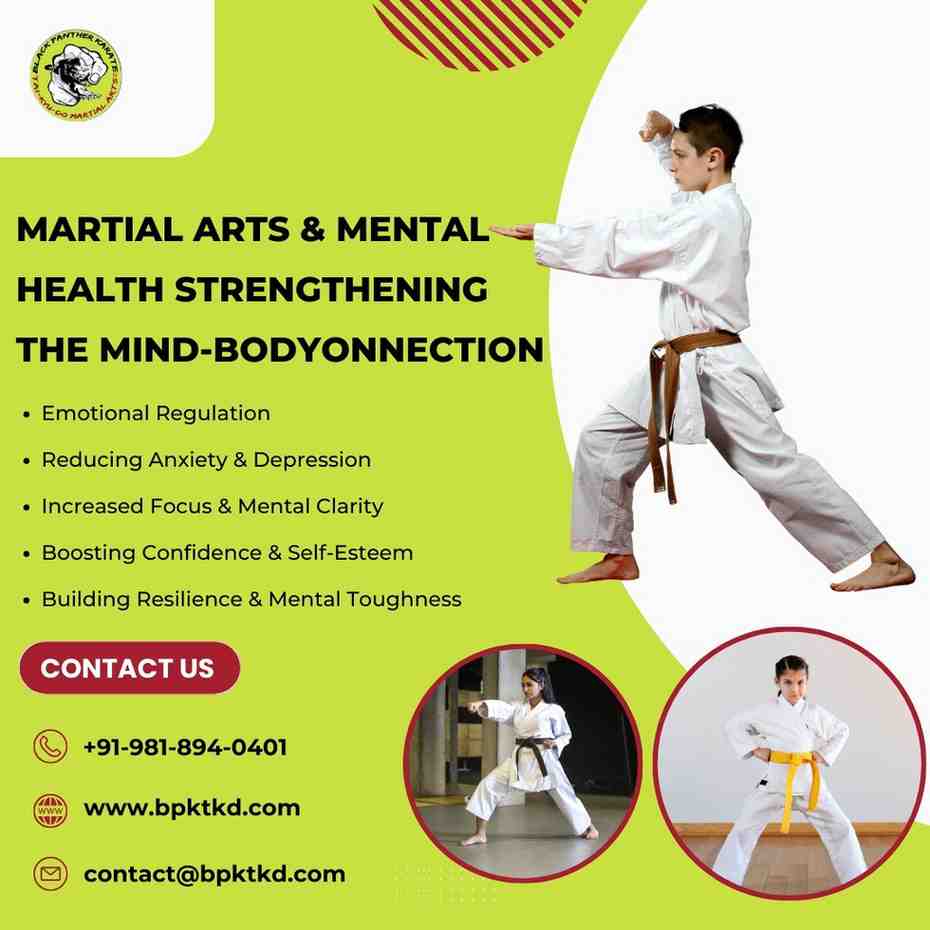
Martial arts are often associated with physical strength, agility, and self-defense, but their impact extends far beyond the body. These ancient practices foster a deep connection between the mind and body, offering a holistic approach to mental health and emotional well-being. In today’s fast-paced world, where stress and anxiety are common, martial arts provide a sanctuary for mental clarity, emotional balance, and psychological resilience. In this blog, we’ll explore the powerful relationship between martial arts and mental health, shedding light on how these practices strengthen the mind-body connection and support mental well-being.
How Martial Arts Benefit Mental Health
1. Stress Reduction
In martial arts, the focus is on being present and in control of one’s body and breath. This mindfulness can significantly reduce stress levels, helping practitioners manage the pressures of daily life.
- Breathing Techniques: Deep, controlled breathing in martial arts calms the nervous system, reducing stress hormones like cortisol. Techniques like abdominal breathing and box breathing slow down the mind and body, promoting relaxation.
- Physical Release: Martial arts offer a way to release pent-up tension and frustration. Punching, kicking, and sparring help the body release endorphins, the “feel-good” chemicals, which alleviate stress and create a sense of euphoria.
2. Increased Focus and Mental Clarity
Martial arts demand complete mental focus, whether during practice or in competition. This mental discipline improves concentration and sharpens cognitive abilities over time.
- Mindfulness in Movement: Martial arts practice is deeply rooted in mindfulness, where every movement is executed with intention and precision. This kind of focus helps quiet the mind, pushing out distractions and worries.
- Mental Training: Techniques like kata in karate or forms in Kung Fu are repetitive, structured movements that require intense mental concentration. Practicing these movements helps build mental clarity, focus, and attention to detail.
3. Boosting Confidence and Self-Esteem
Martial arts cultivate a strong sense of self-confidence. As practitioners progress through various levels, mastering new techniques and skills, they build self-esteem. This growing confidence often translates into everyday life, empowering individuals to handle challenges with a more positive mindset.
- Goal Setting and Achievement: Earning belts or certifications after mastering a set of skills reinforces a sense of achievement. It teaches persistence and patience, boosting self-worth.
- Body Awareness: Learning self-defense techniques builds physical awareness and confidence. Knowing how to protect oneself fosters a strong sense of control over one’s body and surroundings, reducing fear and anxiety.
4. Emotional Regulation
Martial arts are not just about fighting but also about learning to control emotions. In a high-pressure environment, the ability to stay calm and composed is critical. Martial artists are taught to channel emotions like anger or frustration in a controlled and constructive manner.
- Anger Management: Martial arts teach practitioners how to manage anger and avoid impulsive reactions. Techniques focus on redirecting anger into focused physical actions rather than emotional outbursts.
- Emotional Balance: The practice of martial arts helps balance emotions, especially in high-stress situations. It teaches practitioners to maintain composure in the face of adversity, fostering emotional resilience.
5. Reducing Anxiety and Depression
Studies have shown that regular physical activity can help reduce symptoms of anxiety and depression, and martial arts are particularly effective due to their combination of physical exertion, mindfulness, and discipline.
- Endorphin Release: The physical activity in martial arts stimulates the production of endorphins, which elevate mood and reduce feelings of depression.
- Social Connection: Practicing martial arts often involves group classes and teamwork, fostering a sense of belonging. Social interaction and support from peers can combat loneliness and feelings of isolation.
6. Building Resilience and Mental Toughness
Martial arts teach individuals to push through discomfort, failure, and fatigue, building mental toughness. Overcoming challenges in training helps practitioners develop resilience, both physically and mentally.
- Facing Adversity: Martial artists are trained to handle physical challenges and setbacks with a positive mindset. This mental resilience can translate into everyday life, helping individuals deal with personal and professional hardships more effectively.
- Problem-Solving Skills: Sparring and combat situations in martial arts require quick thinking and adaptive problem-solving. This develops cognitive flexibility, allowing practitioners to navigate obstacles with confidence.
Strengthening the Mind-Body Connection through Martial Arts
One of the most profound effects of martial arts is its ability to deepen the mind-body connection. This synergy between the mental and physical aspects of practice is central to achieving balance, inner peace, and mastery in martial arts.
1. Mindfulness and Awareness
Martial arts demand a heightened sense of awareness of both the body and mind. Practitioners must stay present, monitoring their movements, thoughts, and emotions at all times.
- Breathing as a Bridge: Breathing exercises create a bridge between the mind and body, fostering a sense of unity. Techniques like deep breathing during a match or sparring session help control both physical energy and mental state.
- Flow State: Achieving a state of flow—where actions feel effortless and time seems to slow down—is common in martial arts. This state of mind strengthens the connection between mental focus and physical performance.
2. Body Control and Balance
Martial arts emphasize the control and precision of movements, which in turn improves body awareness and balance. This physical mastery enhances self-discipline, helping the mind control the body’s actions in a calm, deliberate way.
- Posture and Alignment: Techniques in martial arts require proper posture and body alignment. Practicing these movements helps develop a strong connection between the mind’s focus and the body’s actions.
- Physical Sensitivity: Martial arts increase sensitivity to bodily sensations, helping practitioners react quickly and effectively to external stimuli, improving both physical and mental responsiveness.
3. Meditation and Visualization
Many martial arts disciplines incorporate meditation and visualization practices to enhance mental clarity and focus.
- Meditation: Some forms of martial arts, like Tai Chi and Aikido, integrate meditation to calm the mind and bring awareness to the present moment. This practice helps improve emotional regulation and mental clarity.
- Visualization: Athletes use visualization techniques to imagine successful outcomes before they occur. In martial arts, practitioners visualize performing moves with precision, which strengthens the mind-body connection by preparing the brain for real-world actions.
Conclusion
Martial arts provide a comprehensive approach to improving mental health by fostering a strong mind-body connection. Through mindfulness, emotional regulation, stress relief, and confidence-building, martial arts help practitioners achieve a balanced state of well-being. Whether you’re looking to reduce anxiety, build resilience, or simply enhance your mental clarity, martial arts offer a powerful tool for strengthening both the mind and body.

